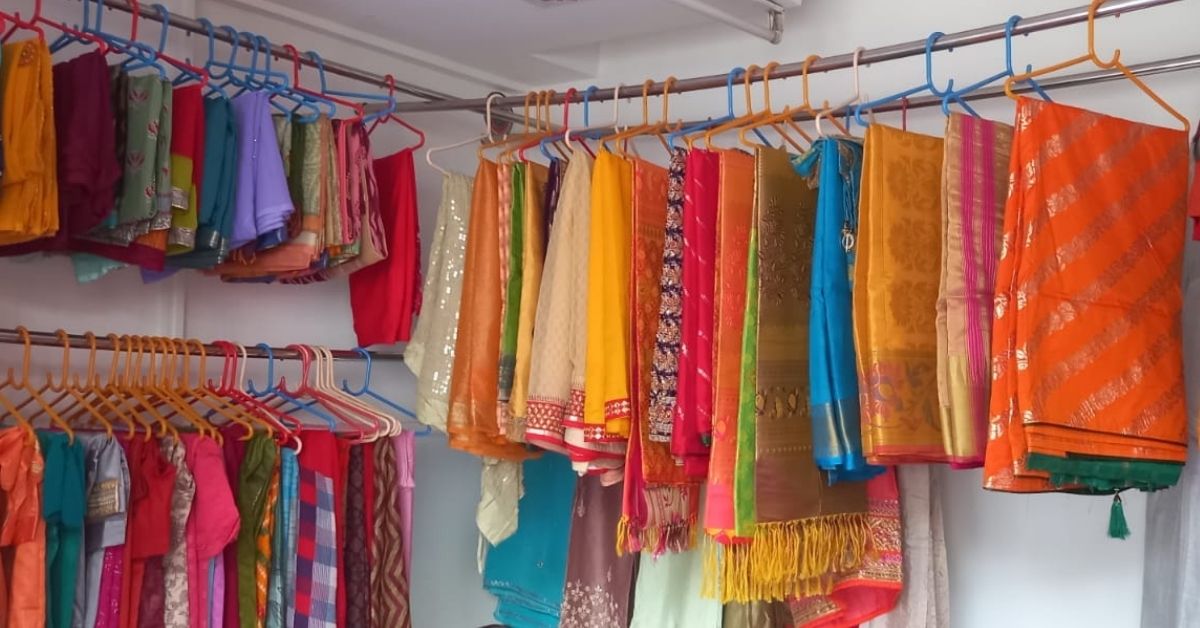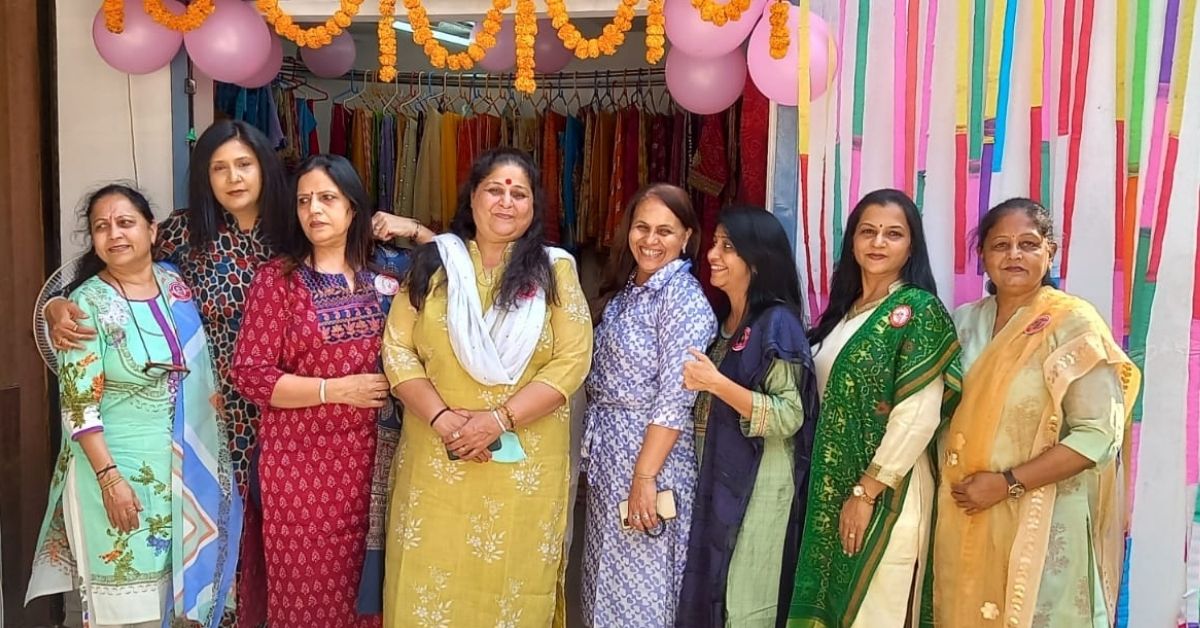With the wedding season currently in full swing, apparel retail outlets across the country are buzzing with invitees looking for the perfect ensemble, which undeniably becomes one of the most fun parts of attending one.
However, not every woman has the luxury of buying six yards of magic each time a social event rolls around. Even for those who can, such events usually mandate a couple of outfit changes, if not more, and it’s wildly unsustainable to continue making exorbitant purchases for a one-time show.
Wouldn’t it be nice if women could feel their best selves in moments of celebrations, sans the guilt of splurging? Turns out, those in Vadodara, Gujarat, can.
A saree library at Malhar Point on the city’s Old Padra Road offers a walk-in facility for women from all income backgrounds to rent as many as three sarees in one go at a nominal cost, for up to five days. Ashta Saheli, an independent community association started by eight friends in June 2020, is behind this special initiative.
“Last summer, my house help said she’d be leaving town for a few days to attend her brother-in-law’s wedding. She mentioned how she wanted to wear something nice but didn’t have the money to buy anything new. I ended up lending her a chanya choli. She said everybody in her family was impressed with her attire and kept asking where she’d bought it. She liked it so much that I never asked for it back,” Hema Chauhan (59), founder of Ashta Saheli, tells The Better India.
“That’s when It first struck me that most of us have ethnic wear that we’ve worn only once or twice. I got in touch with my friends and we decided to do something for the women who can’t afford to make such costly purchases, or simply don’t have the time to shop. We began the library by donating five outfits each from our collections,” she adds.
Inaugurated in October 2021 at a property owned by Hema’s retired husband, the Ashta Saheli library offers a collection of more than 400 sarees, ranging from Kanjivaram silk, Banarsee, Kota checks, Bandhani, to chiffon and georgette. Its collection also boasts of 30 chanya cholis and 60 other ethnic ‘dresses’ such as palazzos, lehengas and blouses.
Besides Hema, the core committee of the Ashta Saheli Group comprises Neela Shah, Rita Vithlani, Parul Parikh, Sadhna Shah, Gopi Patel, Nilima Shah and Twinkal Patel.
The library has catered to over a hundred women so far, and is open from 3 pm to 6 pm every day. “We’re homemakers and can’t leave our responsibilities for too long, so we’ve developed a shift system. Each woman comes in to manage the library for only two days at a time. A couple who run a salon next door also helps us out too,” she says.
Following marketing to its online community of 1,300 members, the group has received donations not only from Vadodara but also from Delhi and Mumbai. “The first woman who reached out to us sent us 30-35 outfits. Most of them were hardly worn and some even had their tags on. Of these, one chanya choli cost about Rs 25,000,” she recalls, adding that the group also received a query from the US recently.

Foundation of Faith
Women at the Ashta Saheli saree library are expected to submit a token amount of Rs 500 while borrowing a saree or any other ethnic piece, which is refunded once they return the apparel.
“We only deduct the dry cleaning expenses from the token fee, but that, too, isn’t much. For instance, It would cost about Rs 100 for a plain saree to be laundered. A saree with zari work, though, might need polishing which can cost up to Rs 250,” Hema explains, adding that a local dry-cleaning business takes care of this.
Ask her how they track the borrowings at the library, and she says that it functions on a foundation of faith. “Bharosa ek aisi cheez hai jo lakdi ki naav ko bhi sona bana deti hai (Trust can turn even a wooden boat golden). We don’t maintain a record of these women’s phone numbers or addresses, but we do keep a picture of their Aadhar cards. There have been times that they have forgotten it at home, but we lend the pieces anyway. By God’s grace, nobody has ever tried to take advantage of us,” she shares.
The saree library has a daily footfall of about 20 people, but Hema says that it has been running at a slow pace. “We’ve had a lot of women coming in to scout outfits for wedding events in January and February; they often bring their blouses along to pick the perfect saree. Some others come in only to appreciate our collection because of its novelty,” she says.
For ethnic wear that hasn’t been rented even once, the Ashta Saheli library will be holding a ‘free sale’ at their premises, once every three months, starting January 2022.
“We also plan on keeping donated purses, jewellery and footwear alongside these clothes. Anybody would be able to take these for free on a first-come-first-serve basis,” she says.

A Tightly-Knit Community
The Ashta Saheli Group was conceptualised as a space of “love, connection and support” amid the growing anxieties of the COVID-19 pandemic’s first wave.
“My friends and I used to keep in touch over the phone but it was a scary and helpless time. Once the lockdown eased out, I asked everyone to come home and suggested doing something, anything, to lift everyone’s spirits,” shares Hema. ”We started posting a couple of motivational videos, which received a lot of good responses. Then, we approached retired IAS officer and family friend, Bhagyesh Jha, for weekly religious lectures, and also reached out to local musicians for bhajan sessions.”
Earlier this year, the group began its ‘live membership’ and as many as 350 Vadodara-based women spanning ages 25 to 75 years, most of whom are homemakers, are presently associated with them. They participate and help in organising cultural and spiritual events, aside from engaging in community welfare.
“We’ve volunteered at old-age homes to take care of women who were left behind by their children when they settled abroad. On Makar Sankranti in 2021, we’re also planning on distributing kites and chikkis to homeless children in our localities,” she adds.
Hema, who recently took to knitting jute purses and spectacle cases, hopes for the saree library to also serve as an entrepreneurial platform for homemakers someday. “We want women to be able to showcase and sell their handmade handicraft products for at least a week at a time,” she says.
“I’ve been through acute poverty during my childhood and realise the significance of [saving] money. The amount of hardships I’ve seen in life…,” her voice trails off. “I’ve been lucky to have such a tightly-knit group of friends and we’ve supported each other through every challenge along the way. As long as God keeps me alive, I’ll keep working towards bringing a smile of satisfaction to anyone who needs it. That is my service.”
For donation, enquiries and further information, you can contact Ashta Saheli Group here.
(Edited by Yoshita Rao)
No comments:
Post a Comment